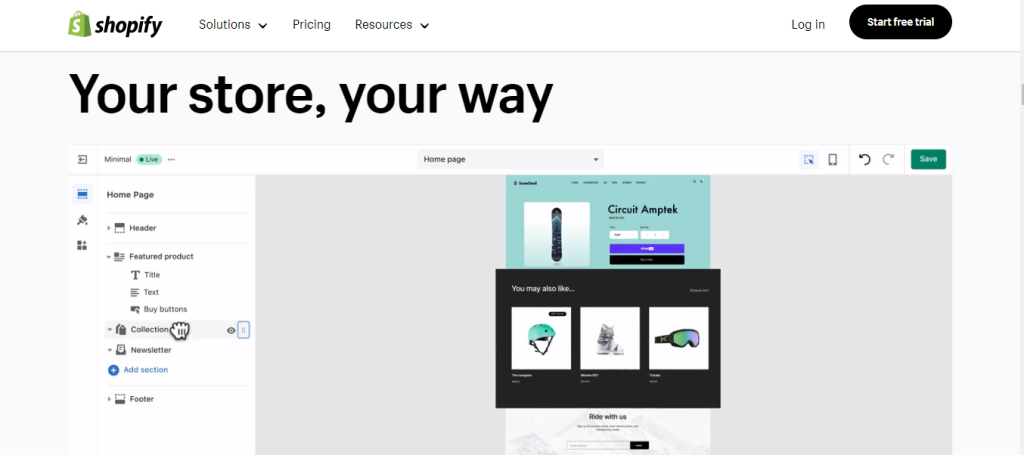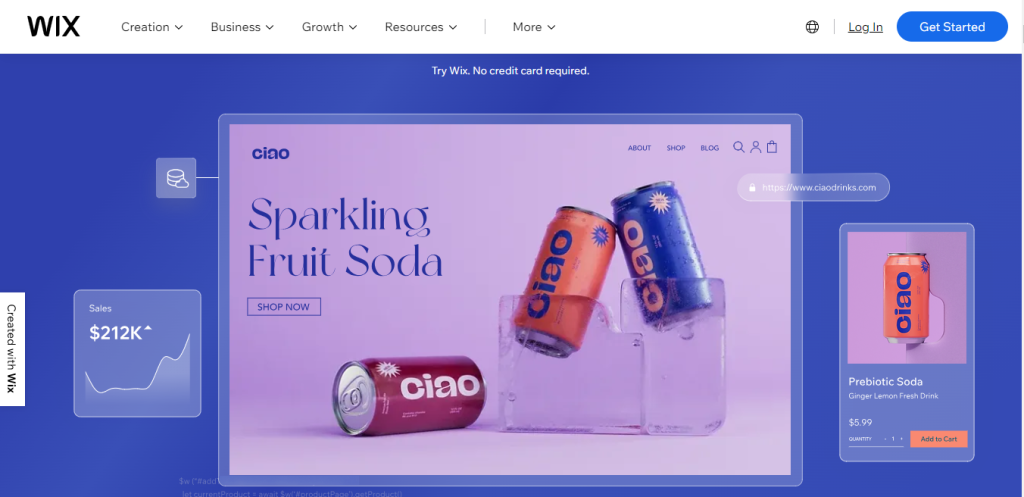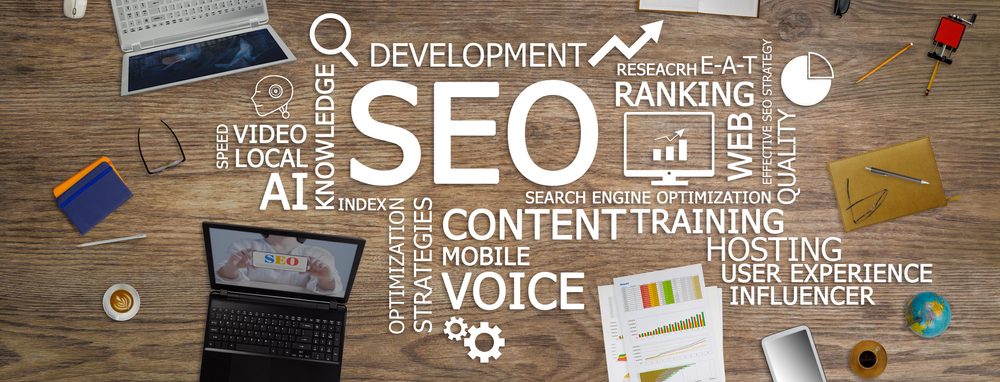Shopify or Wix? In today’s digital era, creating an online presence is essential for businesses. These popular platforms offer robust features and customization options. Let’s explore their strengths, weaknesses, and suitability for different businesses.
Understanding Shopify

Shopify is a leading e-commerce platform that enables businesses to create and manage their online stores effectively. With its user-friendly interface and comprehensive features, Shopify has gained popularity among entrepreneurs and small to medium-sized businesses.
Key Features and Advantages of Shopify
Shopify provides a wide range of features tailored specifically for e-commerce. From customizable themes to secure payment gateways, here are some key advantages of using Shopify:
- Easy Setup and Use: Shopify offers a streamlined setup process, allowing users to create a professional-looking online store quickly. Its intuitive interface makes it easy for beginners to navigate and manage their websites.
- Robust E-commerce Functionality: Shopify provides a rich set of e-commerce features, including inventory management, product variants, discount codes, and customer analytics. These features empower businesses to effectively sell products and scale their operations.
- Mobile-Optimized: In today’s mobile-centric world, Shopify ensures that your online store looks great and functions seamlessly on mobile devices. It offers responsive themes and a mobile app to manage your store on the go.
- App Integrations: Shopify has an extensive app store, allowing users to integrate various third-party applications to enhance their store’s functionality. From marketing tools to shipping solutions, there are numerous options to choose from.
Customization Options in Shopify
Shopify offers a range of customization options to tailor your website to your brand’s unique identity. These include:
- Themes and Templates: Shopify provides a vast collection of professionally designed themes and templates. These can be customized to match your brand’s aesthetics and offer a visually appealing storefront.
- Liquid Programming Language: For advanced users, Shopify allows customization through its Liquid programming language. This enables the creation of custom layouts, functionalities, and dynamic content.
- App Development: Shopify’s API and developer tools enable businesses to build custom apps and integrations to extend the platform’s functionality.
Exploring Wix

Wix is a versatile website builder that caters to a broad audience, including small businesses, creative professionals, and individuals looking to establish an online presence. Known for its user-friendly interface and visually stunning designs, Wix has gained popularity as an all-in-one solution for website creation.
Key Features and Advantages of Wix
Wix offers a host of features and advantages that make it a popular choice for website building:
- Drag-and-Drop Website Builder: Wix’s drag-and-drop editor allows users to create visually appealing websites without any coding knowledge. This feature makes it accessible to beginners and those without technical expertise.
- Visually Stunning Templates: Wix provides an extensive library of professionally designed templates for various industries and purposes. These templates can be customized to match your brand’s style and preferences.
- App Market: Wix offers an App Market with a wide selection of applications to enhance your website’s functionality. From SEO tools to e-commerce plugins, you can find the right apps to meet your needs.
- Built-in SEO Tools: Wix provides built-in SEO tools and features, such as customizable meta tags, sitemaps, and URL optimization. These tools help improve your website’s visibility in search engine results.
Customization Options in Wix
Wix offers several customization options to help you create a unique and visually appealing website:
- Drag-and-Drop Editor: Wix’s intuitive editor allows you to customize every aspect of your website by simply dragging and dropping elements. This makes it easy to arrange content, add images, and create an engaging layout.
- Wix ADI (Artificial Design Intelligence): For users who prefer a more guided approach, Wix ADI generates a personalized website based on your preferences. It offers design suggestions and automatically creates a professional-looking website.
- Wix Code: Advanced users can leverage Wix Code, which provides access to the platform’s JavaScript and database capabilities. This allows for more advanced customizations and dynamic content creation.
- Mobile Optimization: Wix automatically optimizes your website for mobile devices, ensuring a seamless browsing experience across different screen sizes.
Comparing Shopify and Wix

When deciding between Shopify and Wix, it’s important to consider your specific requirements and business goals. Let’s compare these platforms in various aspects to help you make an informed decision.
Features and Functionality
Both Shopify and Wix offer a wide range of features, but their focus differs slightly. Shopify primarily caters to e-commerce businesses, providing robust tools for online selling. Wix, on the other hand, offers broader functionality, including blogging, portfolio creation, and basic e-commerce capabilities when it comes to e-commerce features, Shopify offers a more comprehensive set of tools, including advanced inventory management, flexible product variants, and powerful analytics. Wix’s e-commerce features are more basic in comparison, suitable for small-scale online selling.
Pricing
Shopify and Wix have different pricing structures tailored to meet various business needs. Shopify offers multiple plans starting from the Basic Shopify plan, which is ideal for small businesses. As you grow, you can upgrade to higher-tier plans with more advanced features.
Wix offers several pricing plans as well, including the Connect Domain plan for basic websites and the Business VIP plan for e-commerce. The pricing structure is generally more affordable than Shopify, making it suitable for budget-conscious individuals and small businesses.
Scalability and Future Growth Potential

Shopify is known for its scalability, making it an excellent choice for businesses aiming for significant growth. The platform can handle high traffic volumes, and its extensive range of apps and integrations allows for advanced customization and expansion.
Wix, while suitable for smaller websites and businesses, may have limitations when it comes to scaling. It is more suitable for businesses that don’t anticipate rapid growth or have simpler needs.
SEO Capabilities

Search engine optimization (SEO) is crucial for driving organic traffic to your website. Both Shopify and Wix offer built-in SEO tools, but Shopify provides more advanced options for optimizing your online store.
With Shopify, you have greater control over customizing meta tags, optimizing URLs, and managing redirects. It also provides detailed analytics and insights to help you monitor and improve your SEO efforts.
Wix’s SEO tools are more beginner-friendly, with basic options for customizing meta tags and submitting sitemaps. While it covers the essentials, Shopify offers a more robust SEO infrastructure for businesses with a strong focus on organic search traffic.
User Experience and Design

Both Shopify and Wix excel in offering user-friendly interfaces and visually appealing design options. However, there are some differences in their approaches.
Shopify’s user interface is straightforward and optimized for e-commerce functionality. It provides a seamless experience for managing products, orders, and inventory. Shopify’s themes and templates are specifically designed for online stores, ensuring a cohesive and professional look.
Wix, with its drag-and-drop editor, offers more flexibility in design customization. Its templates cover a wide range of industries and purposes, making it suitable for various types of websites. Wix’s interface is intuitive, allowing users to create visually stunning websites without technical skills.
E-commerce Features and Integration

If your primary goal is to sell products online, both Shopify and Wix offer e-commerce capabilities. However, there are notable differences in their offerings.
Shopify provides extensive e-commerce features, including inventory management, order fulfillment, abandoned cart recovery, and multi-channel selling. It integrates seamlessly with popular payment gateways and supports multiple currencies, making it ideal for businesses with complex e-commerce needs.
Wix’s e-commerce functionality is more basic, suited for smaller-scale online selling. It offers features such as product listings, shopping carts, and secure payment options. While it may not have the advanced features of Shopify, it provides a simpler and more affordable solution for businesses with basic e-commerce requirements
Support and Customer Service

When running an online business, reliable support and customer service are crucial. Both Shopify and Wix offer support through multiple channels.
Shopify provides 24/7 customer support via phone, live chat, and email. It also has an extensive knowledge base, community forums, and video tutorials to help users navigate the platform. Shopify’s dedicated support ensures that you have access to assistance whenever you need it.
Wix offers support through phone, email, and a ticketing system. It also provides an extensive help center with articles, tutorials, and a community forum. While Wix’s support is generally reliable, it may not offer the same level of dedicated assistance as Shopify.
Case Studies and Success Stories

To showcase the effectiveness of Shopify and Wix, let’s take a look at real-world examples of successful businesses using these platforms.
Shopify Success Story: "ABC Clothing"
ABC Clothing, a start-up specializing in sustainable fashion, chose Shopify as their e-commerce platform. With Shopify’s comprehensive e-commerce features and intuitive interface, ABC Clothing was able to set up their online store quickly. They utilized Shopify’s extensive theme options to create a visually appealing website that matched their brand identity.
Using Shopify’s inventory management tools and integrations with shipping providers, ABC Clothing efficiently managed their stock and fulfillment processes. Shopify’s SEO capabilities and integrations with marketing apps helped them drive organic traffic and reach their target audience. As a result, ABC Clothing experienced significant growth in online sales and expanded their product offerings.
Wix Success Story: "XYZ Photography"
XYZ Photography, a freelance photographer, used Wix to create an impressive portfolio website. With Wix’s drag-and-drop editor, XYZ Photography easily customized their website, showcasing their portfolio in a visually stunning manner. Wix’s templates provided a solid foundation, and the intuitive interface allowed for quick and hassle-free updates to the website.
Utilizing Wix’s built-in SEO tools, XYZ Photography optimized their website for search engines, resulting in increased visibility and inquiries from potential clients. Wix’s integration with third-party photography apps also enhanced their website’s functionality, allowing clients to view and purchase prints directly from the website. Thanks to Wix, XYZ Photography established a strong online presence and attracted a wider audience.
Conclusion
Choosing between Shopify and Wix ultimately depends on your specific needs and goals. Shopify offers powerful e-commerce functionality and scalability, making it an excellent choice for businesses focused on online selling. On the other hand, Wix provides a user-friendly interface, visually stunning designs, and a broader range of functionality, making it suitable for various types of websites.
Consider factors such as the nature of your business, desired level of customization, e-commerce requirements, and long-term growth potential. Carefully evaluate the strengths and weaknesses of each platform to make an informed decision that aligns with your business goals. Whichever platform you choose, both Shopify and Wix have proven track records of supporting successful online businesses.
Frequently Asked Questions (FAQs)
Yes, it is possible to migrate your website from one platform to another. However, the process can be complex and may require technical expertise or the assistance of professionals specializing in website migration.
While both platforms offer built-in SEO tools, Shopify provides more advanced options and flexibility for optimizing your website. If SEO is a top priority for your business, Shopify may be the better choice.
Yes, Wix offers e-commerce functionality that allows you to sell products online. However, it’s worth noting that Shopify provides more advanced e-commerce features and a dedicated focus on supporting online stores.
No, Shopify caters to businesses of all sizes. It offers different pricing plans tailored to various needs, including affordable options for small businesses and start-ups.
Yes, both platforms allow you to use your own domain name. You can either register a new domain through their services or connect an existing domain to your website.
Remember, it’s important to thoroughly research and consider your specific requirements before making a decision.


